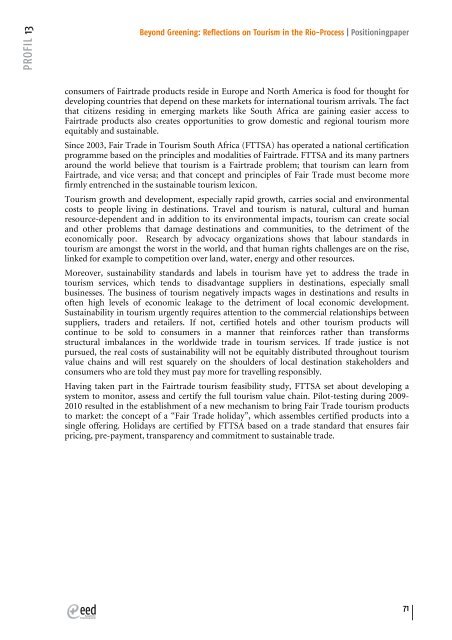<strong>Beyond</strong> <strong>Greening</strong>: Reflections on <strong>Tourism</strong> in the Rio-Process | PositioningpaperBuilding on these success stories, the Sustainable <strong>Tourism</strong> Network of Southern Africa(STNSA) was established in 2007 to create a platform for improved coordination betweensustainable tourism stakeholders located in the Southern African Development Community(SADC). The STNSA operated informally, bringing together tourism boards and ministries,certification programmes and NGOs to share best practice and respond to trends in theexternal environment. The STNSA served as a focal point for its members to engage with theTSC/GST-Council, particularly with regard to the design of the GSTC accreditation system.The STNSA became inactive in 2010, due to a lack of resources as well as a lack of consensus asto what should be the strategic focus of the Network. However, the Network was re-launchedin May 2012 as the Sustainable <strong>Tourism</strong> Certification Alliance Africa (STCAA), with clearermembership criteria and a new strategic focus on the SCP enabling environment.These three examples of regional networks in Latin America, Europe and Africa demonstratethe value of cross-border collaboration for the tourism certification sector. The weaknesses ofnetworking as a strategy for collaboration include over-dependence on one or moreorganisations to drive activities (usually the Secretariat) and dependence on external funding.Networks only “work” when members get value from them.Lessons from FairtradeFairtrade is a worldwide trading partnership comprised of producers in developing countries;traders and retailers; and national licensing initiatives whose role is develop demand forsixteen categories of fairly traded products including coffee, tea, sugar, cocoa and compositeproducts like confectionaries. The first Labelling organization was Max Havelaar in Holland,launched in November 1988. Nine years later the Fairtrade Labelling Organization (FLO)established in 1997. Fairtrade is managed globally under the auspices of the Fairtrade LabellingOrganisations (FLO), also known as Fairtrade International.Global sales of Fairtrade products were measured at €4.36 billion in 2010, up by 28% on theprevious year, demonstrating resilience even in difficult economic times. Impressively, theinternational Fairtrade mark is recognized by 96% of British, 90% of Swiss, 75% of Dutch and69% of German consumers (Globescan 2011).Harriet Lamb, Director of the very successful UK Fairtrade Foundation, opened World 2011Responsible <strong>Tourism</strong> Day in London, and challenged the travel and tourism industry to seekinspiration from Fairtrade (Lamb, 2011). Lamb spoke passionately about the power ofFairtrade to transform the ordinary act of doing the household shopping into extraordinarybenefits for producers in the Global South. These benefits are manifest in fairer tradingconditions, long-term trading partnerships and the creation of new resources for sustainabledevelopment through the Fairtrade premium, a portion of the price paid to producers that isreserved for Fairtrade beneficiaries (workers and communities) to invest in education,community health and other types of social infrastructure and in the case of cooperatives,business development.There are obviously many parallels between Fairtrade and sustainability standards and labelsin tourism as well as the trend towards traveller’s philanthropy. A critical success factor ofFairtrade lies in strong coordination between national labelling initiatives including new onesin the South, most notably Fairtrade Label South Africa (FLSA). Another hallmark ofFairtrade’s success is the creation of a single, well known and highly trusted label. This successhas been underpinned by professionalization of Fairtrade based on the principles of ISO65, sothat certification is divorced from market development to avoid conflict of interest.During 2006-2009, Fairtrade International conducted feasibility research that demonstratedstrong potential demand for Fairtrade travel (Zonneveld, 2008). That tens of millions of loyal70
<strong>Beyond</strong> <strong>Greening</strong>: Reflections on <strong>Tourism</strong> in the Rio-Process | Positioningpaperconsumers of Fairtrade products reside in Europe and North America is food for thought fordeveloping countries that depend on these markets for international tourism arrivals. The factthat citizens residing in emerging markets like South Africa are gaining easier access toFairtrade products also creates opportunities to grow domestic and regional tourism moreequitably and sustainable.Since 2003, Fair Trade in <strong>Tourism</strong> South Africa (FTTSA) has operated a national certificationprogramme based on the principles and modalities of Fairtrade. FTTSA and its many partnersaround the world believe that tourism is a Fairtrade problem; that tourism can learn fromFairtrade, and vice versa; and that concept and principles of Fair Trade must become morefirmly entrenched in the sustainable tourism lexicon.<strong>Tourism</strong> growth and development, especially rapid growth, carries social and environmentalcosts to people living in destinations. Travel and tourism is natural, cultural and humanresource-dependent and in addition to its environmental impacts, tourism can create socialand other problems that damage destinations and communities, to the detriment of theeconomically poor. Research by advocacy organizations shows that labour standards intourism are amongst the worst in the world, and that human rights challenges are on the rise,linked for example to competition over land, water, energy and other resources.Moreover, sustainability standards and labels in tourism have yet to address the trade intourism services, which tends to disadvantage suppliers in destinations, especially smallbusinesses. The business of tourism negatively impacts wages in destinations and results inoften high levels of economic leakage to the detriment of local economic development.Sustainability in tourism urgently requires attention to the commercial relationships betweensuppliers, traders and retailers. If not, certified hotels and other tourism products willcontinue to be sold to consumers in a manner that reinforces rather than transformsstructural imbalances in the worldwide trade in tourism services. If trade justice is notpursued, the real costs of sustainability will not be equitably distributed throughout tourismvalue chains and will rest squarely on the shoulders of local destination stakeholders andconsumers who are told they must pay more for travelling responsibly.Having taken part in the Fairtrade tourism feasibility study, FTTSA set about developing asystem to monitor, assess and certify the full tourism value chain. Pilot-testing during 2009-2010 resulted in the establishment of a new mechanism to bring Fair Trade tourism productsto market: the concept of a “Fair Trade holiday”, which assembles certified products into asingle offering. Holidays are certified by FTTSA based on a trade standard that ensures fairpricing, pre-payment, transparency and commitment to sustainable trade.71












